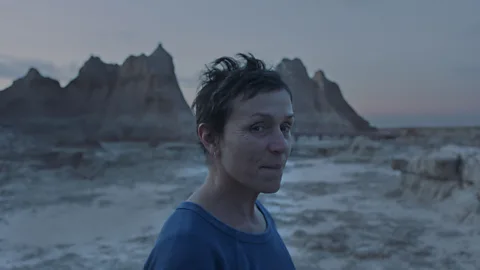Nomadland review: ‘Overflowing with humanity and tenderness’
 Searchlight Pictures
Searchlight Picturess McDormand is “magnificently natural” in her latest film, Nomadland, written and directed by Chloé Zhao. It’s an “illuminating, tough-minded portrait”, writes Caryn James.
“I’m not homeless, I’m just houseless,” s McDormand says as Fern, who lives in her van and has just encountered a concerned former student. “Don’t worry about me, I’m OK,” she says. That reassurance is true but also brave and defiant, reflecting the complex reality beneath the deceptively simple Nomadland, which won the Golden Lion at the 2020 Venice Film Festival. McDormand, magnificently natural as Fern, and Chloé Zhao, the writer and director, are an ideal team. They deliver an illuminating, tough-minded portrait of older Americans displaced by society.
More like this:
McDormand initiated the project and produced the film, a fictionalised version of Jessica Bruder’s non-fiction book Nomadland: Surviving America in the 21st Century. Bruder chronicled people who, by choice or more often economic necessity, began living a nomadic, hand-to-mouth life after the 2008 financial collapse. McDormand brought in Zhao, a brilliant choice, who builds on the strengths she displayed in The Rider (2017): a rare talent for evoking vivid, credible performances from non-actors, and for immersing viewers in the myriad stunning landscapes of the American West.
Fern, an invented character, is a widow whose mining town in Nevada collapsed financially and who now subsists on seasonal jobs. As she travels from snowy plains to the desert, she meets a cadre of other nomads, mostly non-actors portraying fictional versions of themselves. Almost a hybrid of documentary and fiction, Nomadland is overflowing with humanity and tenderness for its characters. And its bedrock of social commentary is even more pertinent in today’s economic landscape.
The tone is set by an early image: Fern’s van is the only vehicle on a road surrounded by vast, empty space with mountains in the distance. In that one shot we see her loneliness and isolation, but also her individualism and resilience. She is part of a long tradition of US heroes and adventurers who, as Huckleberry Finn put it, decide “to light out for the territory,” and leave ordinary life behind.
Those mountains and plains look timeless, but Fern’s world is 21st Century. She packs Amazon boxes at Christmas, living alongside other workers in an RV park. The jobs she finds as she moves include working in a restaurant kitchen in South Dakota and acting as a so-called host at a campground. That hosting gig includes cleaning filthy bathrooms in the Badlands National Park, but we also see her hiking and standing alone with gorgeous, pink-hued cliffs behind her.
Even more important for the film’s purposes, Fern becomes part of a spotty but valued makeshift community of other nomads. She goes to a desert campground where Bob Wells leads his annual gathering of nomads in what he calls the Rubber Tramp Rendezvous. Like the jobs Fern has and places she visits, the event is a real thing, and Wells is among the non-actors who become characters in Fern’s life, several of whom tell her their stories. In one of the most affecting scenes, Fern talks to a friend named Swankie, a woman in her seventies in failing health, who reflects on her life.
Other travellers tell of spouses and friends who have died. Many have been tossed aside by corporate America. Those histories are presented without sentimentality or condescension – an irable choice, but one that occasionally makes Nomadland feel a bit clinical. Even then, McDormand’s commanding, deeply empathetic performance holds the film together. She is so convincing and unaffected that it feels as if Fern is another non-actor whom Zhao magically gets to be natural on screen. Only one character, a younger man in a minor role, is awkward and breaks the spell of fiction. Similarly, Ludovico Einaudi’s score, which often has a New Age feel, creates minor distractions from the film’s unflinching realism.
The freedom of fiction allows Zhao and McDormand to make Fern the embodiment of all the nomads’ stories, but she’s also distinctly herself. Her life, solitary more often than not, is unglamorous and precisely depicted. In her cramped van, she looks at old family photographs, cooks canned soup on a single burner and uses a plastic bucket as a toilet.
David Strathairn is one of the few other professional actors, playing a nomad named Dave who has a lopsided friendship with Fern. He seems attracted to her while she is more detached. Strathairn is solid as always, but the relationship feels like a device meant to goose the plot in what is essentially a plotless, character-driven film.
It was a wise move on Zhao’s part to eventually include some suburban homes, where Fern and Dave have relatives ready to help. They may not have ideal choices but they both have alternatives to life on the road, options they have rejected. One of those family , trying to be kind, compares nomads to pioneers. That is true enough, but as the bracing Nomadland reveals, it is also too simplistic a view for today’s US, with its ageing population in a devastated economy.
★★★★☆
Nomadland is released December 2020 in the US and Canada, and January 2021 in the UK and Ireland.
Love film and TV? BBC Culture Film and TV Club on Facebook, a community for cinephiles all over the world.
If you would like to comment on this story or anything else you have seen on BBC Culture, head over to our Facebook page or message us on Twitter.
And if you liked this story, sign up for the weekly bbc.com features newsletter, called The Essential List. A handpicked selection of stories from BBC Future, Culture, Worklife and Travel, delivered to your inbox every Friday.
